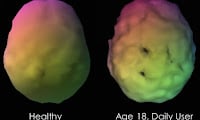Why are some of the anti-Alzheimer’s antibodies turning out to be more successful at fighting this disease than others? Research by David Klenerman at the University of Cambridge and Bart De Strooper at the UK Dementia Research Institute, University College London, are providing good, solid insights.
Their research focuses on four monoclonal antibodies:
- Aducanumab,
- Lecanemab, (brand name Leqembi)
- Gantenerumab, and
- Donanemab (brand name Kisunla).
These antibodies are being developed to treat Alzheimer’s disease. Lecanemab and Donanemab have been approved by the FDA for treatment.
Their research study uses advanced techniques to look at how these antibodies interact with beta-amyloid aggregates, which are protein clumps found in the brains of people with Alzheimer’s.
Key Findings:
- Binding Efficiency: The researchers found that Lecanemab is the most effective antibody at binding to small, soluble beta-amyloid aggregates. This means it can attach to these protein clumps better than the other antibodies.
- Affinity and Coating: Lecanemab also has a higher affinity (stronger binding) and better coverage on the aggregates.
- Post-Translational Modifications: Lecanemab can bind to beta-amyloid aggregates that have undergone certain chemical changes, which is important for its therapeutic success.
Conclusions:
Lecanemab is the best antibody in terms of:
- binding to the small-soluble beta-amyloid aggregates,
- affinity,
- aggregate coating, and
- the ability to bind to post-translationally modified species.
Significance:
Understanding how these antibodies interact with beta-amyloid aggregates helps researchers develop better treatments for Alzheimer’s disease.
Lecanemab’s superior binding properties make it a promising candidate for future therapies, in some ways, the most promising.












